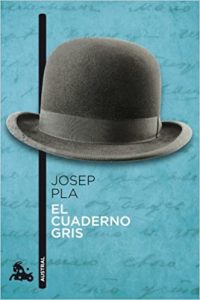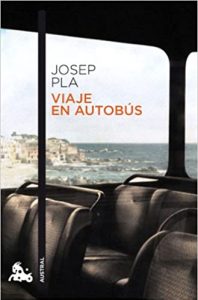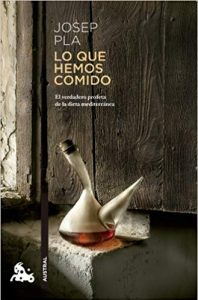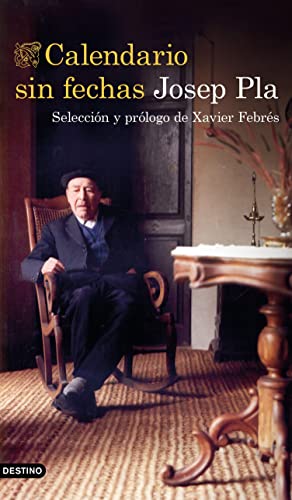El Catalan writer Josep Pla he is remembered today with that strange virtue of good sense between the pan-Catalanist and the retro-Spanishist. In that Middle-earth, as fantastic as it sounds thus quoted evoking Tolkien , resides intelligence and measure; the right distance of the polarization of one and the other side; criticism and balanced thinking in common sense.
Come on, what is usually the best space for someone to be a writer and tell how things are. Equidistance and clairvoyant warmth, yes. Above all to face the closures of both sides. Because let's not be squeamish, the Catalan separatisms fed on hatred are so obfuscated, as are the sheep who still admire the eagle on the Spanish flag. And the poles, you know, are the same in reverse order ...
It is partly sad to have to approach the work of an author like Josep Pla, showing in the first place that privileged prism of the author in the face of ideological authoritarianisms. But hey, neither did he shy away from the matter in his essays or other works of reflection.
The point is that in its diverse bibliography you can find everything. Because in Pla we find that function, more or less conscious, of the chronicler of an era, of the traveler out of devotion or even sometimes by imposition, to end up enjoying a world-aware, traveled and open pen.
Top 3 recommended books by Josep Pla
The gray notebook
The paradigmatic work of a Pla that occupied a large part of his life in his writing and rewriting. A privilege that, except in the purest novel that ends up succumbing to its structure and ending, every book should register to approach the author in his kaleidoscopic vision of the passing of the years.
From the Pla that began in writing to the outside, opening to Barcelona at the beginning of the XNUMXth century to finish painting that complete canvas, varied from the descriptive with its impressionist connotations of the writer, to the analytical in the sociological and the dynamic in the presentation of the whole as a vital plot. The cosmopolis, the emblem of Catalonia brimming with modernity and modernism but in which revolts were also forged in search of social conquests.
Contrasts seen live by the author and retouched years later, many years later, to end up composing that story between the shock of youth and events and the residue of maturity capable of seeing everything with a point of depersonalization. With its composition between the chronicle and the personal diary, The Gray Notebook traces that perfect portrayal of the observer capable of providing the lucidity that the power of bitter ideas never find.
Trip by bus
A fleeting bus trip, one of those dead times in which the traveler surrenders to the inertia of the elusive landscape. Unless the traveler is Josep Pla. And except, it must also be said, that it is a postwar bus trip, with its speed of stagecoach drawn by horses and its eternal stops in remote places awaiting one more order with which to justify gasoline.
But those trips were like that, perfect for a writer who wanted to tell them, to make those dead times transcendent. Because the greatest goal of literature is to recover what has been evaded, to relive those moments full of innumerable nuances that a traveler of today displaced in time would analyze with the enjoyment of man back to paradise. With his precise and fully effectual language, Pla tells us about the details that occur, the thoughts that come and go in the traveler over the course of a hundred kilometers pointed out as best he can in pages. One of those cures, literary placebo to stop our hectic time.
What we have eaten
Some time ago a friend, with a wink and an indecipherable smile, handed me a recipe book to read. As if I were a cooking lover without knowing how to make a potato omelette! As soon as I got on with him I discovered the trick.
It was not a matter of presenting the recipes one by one, but rather that of each dish the author first presented the literary aroma from the origins of each food, its customs to even a historical connection. I never had less than the simplest dish ever again. This is how I understood my friend's smile and found another area of literature in culinary matters. So it was not difficult for me then to give way to this book by Josep Pla on aromas, knowing that reading about food was reading about pleasure and sustenance, something like a work of the Marquis de Sade between stoves.
In the case of this book by Pla, the issue is about the certain melancholy of past enjoyments on a table, always recoverable with that hint of longing, perhaps, on a table in the same sea breeze but turned into whispers of absences that they shared. the enjoyment of the palate on other days.
What we have eaten, what we ate, the flavors that never quite return and the rediscovery of new tastes as the palate also changes and ages, not always for the worse in the culinary, such as wines. a memory. Finally reaching in the flavor the fullness of what has been eaten by what has been lived, is that magic that composes existential essences. In the gastronomic memory of Pla we discover all the tastes that we enjoy on the palate and those that we have yet to discover.
Other recommended books by Josep Pla
calendar without dates
For the first time, a selection of the more than 1.700 articles that Josep Pla wrote weekly in his section entitled "Calendario sin dates" in the weekly magazine Destino, in which he collaborated from 1939 to 1975, is published in its original version. therefore a first and shows that the author also continued to write in Spanish until the end. Some articles that were the forge of most of his books and that now provide the discovery of a living style in its original form.





1 comment on «3 best books by Josep Pla»